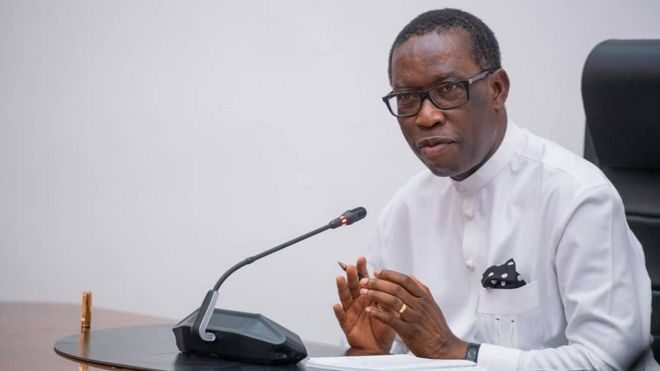
Delta State Governor, Dr. Ifeanyi Okowa, has
described as worrisome the ritualistic dimension the rising cases of
gender-based violence (GBV) has assumed in the country.
Okowa made the remarks on Tuesday in Asaba at the
Delta State Sexual and Gender-based Violence (SGBV) stakeholders conference with
the theme: ‘Generation Equality: Stand Against Rape, and other forms of SGBV’.
The event was organised by the Delta State Sexual
and Gender-based Violence Response Team (DSGBVRT) in collaboration with the O5
Initiative Foundation, an NGO, to sensitise the public on the need to check the
menace of rape as the major aspect of gender-based violence.
Speaking through his Deputy, Mr. Kingsley Otuaro, Okowa
noted that rape cases had become a disturbing phenomenon that needed to be tamed
because it has a negative impact on the country's development.

He said the menace of rape is on the increase in
the society with grave negative impact on the national development.
Okowa said: "Some speakers have identified
poverty as the cause of the GBV. We agree, but there are many other causes
which call for a holistic approach to tackle it.
"Gender-based violence has become a disturbing
phenomenon and most of the actions are ritualistic; where older men have raped
very young children aged below six years."
However, the governor thanked the organisers of the
conference for deepening the people’s understanding, and challenged
participants to come up with recommendations that are implementable and would
influence attitudinal change among the people.
On her part, wife of the governor, Dame Edith
Okowa, who is the founder of O5 Initiative, lamented the poor attitude of
parents to their children's upbringing.
She said lack of parental care remained a major
cause of GBV being witnessed in the Nigerian society today.
Mrs. Okowa said: "Most mothers have abandoned
their homes in pursuit of money and enhanced social status thereby leaving
their children in the bare to the societal menace.
"Parents must all return to their original
love and care for the family and to God as a solution.”
On his own, the state Chief Judge, Justice Marshall
Umukoro, said the state judiciary was committed to prosecuting cases of rape
and other related issues, but the constraint has been the reluctance of victims
and family members to testify.
Umukoro said: "We have 101 pending cases of
rape in our courts; we have convicted some perpetrators but our challenge is
the unpreparedness of victims to come forward to testify.
"We have no fewer than 3,500 inmates in
correctional homes in the state and their ages range from 17 to 25.
"Our investigations showed that all these
people were from broken homes with absentee fathers and mothers who no longer
have time for their children."
The state Commissioner for Women Affairs, Mrs.
Flora Alanta, said women are worst hit as rape cases, while other forms of
violence has been a rival between the men and the women.
According to her, 95 percent of persons trafficked
are women and girls, higher percentage of them raped daily by stronger men,
"but I want to call on the men to 'zip-up' and our women and girls should
close up by dressing decently in order to check the menace."
In his welcome address, the state Attorney-General
and Commissioner for Justice, Peter Mrakpor, who is the Chairman of DSGBVRT, said
sexual and gender-based violence has become pandemic.
He noted that the essence of the meeting was to
sensitise the public on the danger and consequences and to prefer solutions on
how to handle issues of GBVs as no society, country or region is immune to
SGBV.
There are existing laws in the country to deal with
the issues related to rape, such as Section 357 Criminal Code, which provide
life imprisonment for rape, he noted.
"The state government and the civil societies
need to be more sensitive and creative in order to deal with the problems as
joint actions by the national and international governments are a crucial
necessity in addressing sexual and gender-based violence," Mrakpor said.
No comments:
Post a Comment